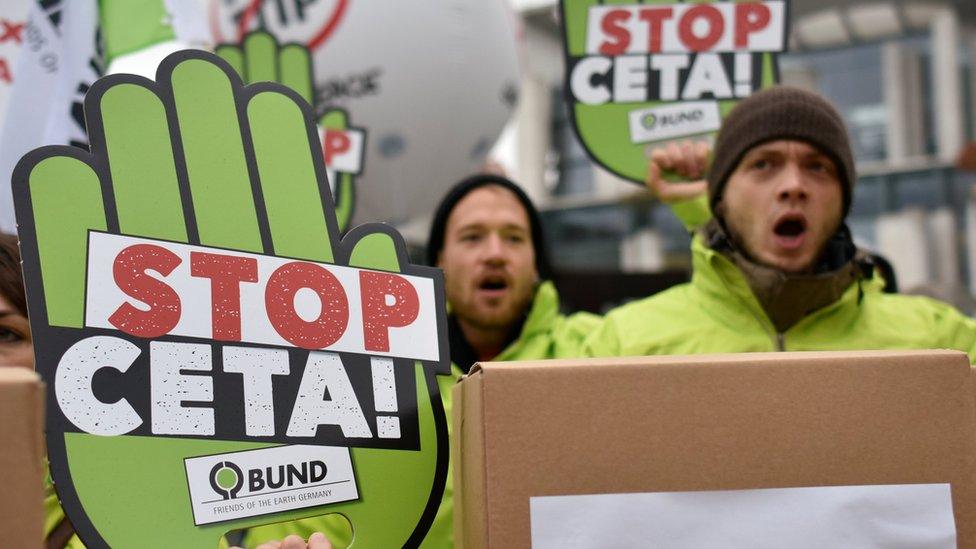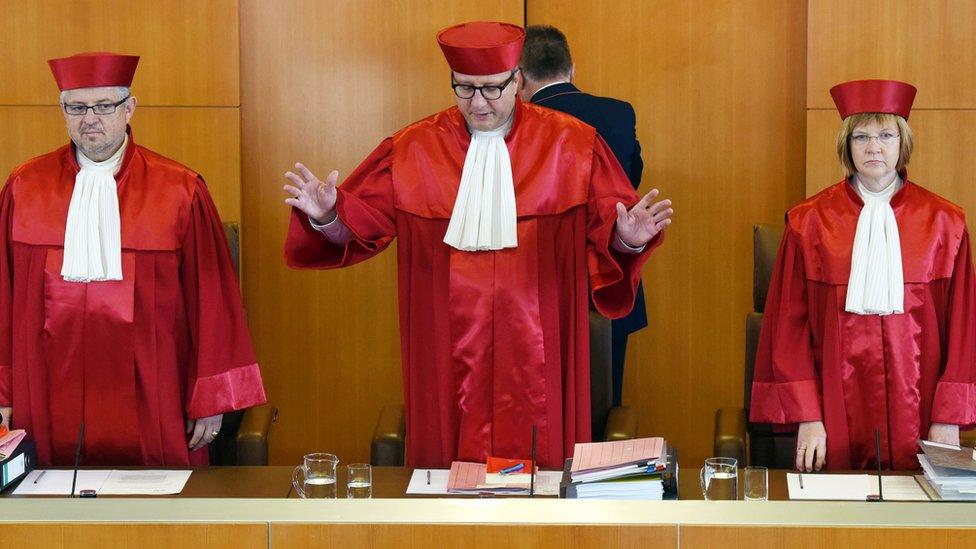German top court backs EU-Canada trade deal Ceta
- Published

Activists called it the biggest constitutional complaint in German history
Germany's Constitutional Court has rejected a legal challenge to the EU-Canada free trade deal (Ceta) from campaigners who call it undemocratic.
The campaigners object to the fact that parts of Ceta will be implemented before all national parliaments in the EU have voted on it.
EU trade ministers are to decide on Ceta next Tuesday. If they all approve it, the deal can be signed with Canada on 27 October.
Ceta would remove many trade barriers.
It would be the EU's most comprehensive trade deal to date, and the negotiations have taken seven years.
More than 125,000 people signed a petition organised by three activist groups aimed at blocking Ceta, the Comprehensive Economic and Trade Agreement. The groups are Campact, external, Foodwatch, external and More Democracy, external.
'Race to the bottom'
Opponents fear that Ceta will be used as a model to push through an even more controversial EU-US trade deal called TTIP, much of which remains to be negotiated.
The activists argue that Ceta and similar deals put job security and social welfare at risk, in a global "race to the bottom" that serves the interests of a wealthy elite.
Canadian Prime Minister Justin Trudeau warned on Thursday that "if Europe cannot manage to sign this agreement, then that sends a very clear message not just to Europeans but to the whole world that Europe is choosing a path that is not productive, either for its citizens or for the world, and that would be a shame".
German Economy Minister and Vice-Chancellor Sigmar Gabriel has battled to win his Social Democrats (SPD) round to Ceta. The SPD is in government with Chancellor Angela Merkel's Christian Democrats (CDU), who strongly support Ceta.

The Constitutional Court in Karlsruhe often examines disputed aspects of EU law
Mr Gabriel said he was happy with Thursday's court ruling. Ceta, he said, would act as "protection against having a bad deal with the US".
Some British politicians see Ceta as a good basis for a post-Brexit UK trade deal with the EU. The UK can vote for Ceta while it remains a full EU member.
Ceta does not involve EU-style free movement of labour. But for services - 80% of the UK economy - the Ceta terms are less favourable than what they have now.
Would Ceta be a good model for the UK?
The judges in Karlsruhe did not, however, exclude the possibility of Ceta hitting obstacles in Germany in future.
By signing Ceta, they said, the government can only fast-track the deal's EU-wide provisions. Areas of national responsibility - such as intellectual property, maritime transport and commercial arbitration - must await parliamentary approval.
A new Investment Court System (ICS), external - one of the most controversial issues - cannot be set up until Ceta is ratified by all EU parliaments, they said.

At a glance: Ceta
Negotiations began in 2009 and ended in August 2014
The deal aims to eliminate 98% of tariffs between Canada and EU
Signing expected on 27 October, to implement parts of Ceta, then European Parliament and national parliaments vote on it
It includes: new courts for investors; harmonised regulations; sustainable development clauses; and access to public sector tenders
The deal is opposed by various groups, including environmental activists, trade unionists, and Austrian Socialists

Doubts remain about whether Belgium will back Ceta. All six governments in Belgium - national and regional - have to approve it, but there is opposition in the French-speaking Wallonia region.
Mr Gabriel said the opponents were mixing up Ceta with TTIP. The EU negotiated safeguards for public services, Europe's cultural heritage and the cherished precautionary principle, he said.
The EU's precautionary principle, external means extensive risk assessments have to be carried out before a chemical or medicine can be marketed. In the US, the onus is on proving that a substance is hazardous before it can be withdrawn from sale.
Many politicians and business leaders argue that Ceta will provide a much-needed economic boost, reducing bureaucracy and creating jobs.
Prime Minister Trudeau asked: "If in a week or two we see that Europe is unable to sign a progressive trade agreement with a country like Canada, well, then with whom will Europe think that it can do business in the years to come?"